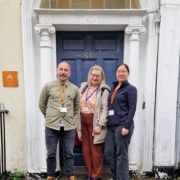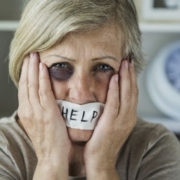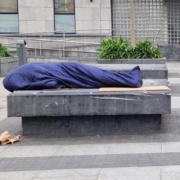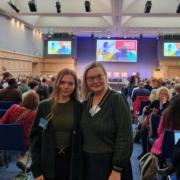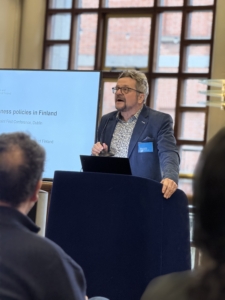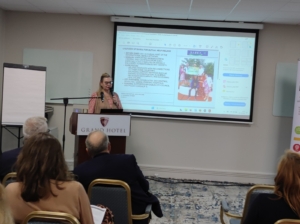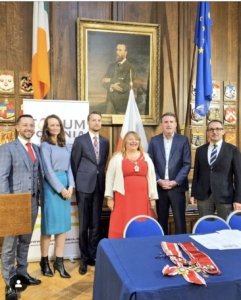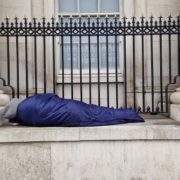BARKA IE: Helping People Reconnect and Reintegrate
Introduction
BARKA IE is a charitable organization based in Dublin, dedicated to assisting individuals experiencing homelessness.
Established in 2011, BARKA IE is a part of the global BARKA Network, which has branches in the UK, Netherlands, Belgium, and Iceland, with its origins in Poland. The organization was founded in response to the rising number of Central and Eastern European migrants living on the streets of Ireland, struggling with homelessness and substance abuse.
Mission and Approach
BARKA IE aims to provide sustainable solutions for people experiencing homelessness. The organization primarily focuses on helping individuals reconnect with their home countries and socially reintegrate. This is facilitated through the extensive support network provided by the Barka Foundation Network in Poland, which offers opportunities for individuals to reunite with their families or receive help for addiction problems
Services Provided
BARKA IE offers a range of services designed to support people in overcoming homelessness:
-
Reconnection and Reintegration Programs: Through the Barka Foundation Network in Poland, individuals can return to their families or receive assistance in addressing addiction issues.
-
Personalized Support: BARKA IE’s migrant support projects are delivered by teams consisting of a leader and a social assistant, ensuring personalized and effective assistance.
BARKA IE IN NUMBERS
TOTAL NUMBER OF RECONNECTIONS
2024:
137 PERSONS
TOTAL NUMBER OF RECONNECTIONS
SINCE ESTABLISHMENT:
1137 PERSONS
Reconnections
Between January 1, 2024, and December 31, 2024, BARKA Ireland reconnected 137 individuals with their home countries.
The demographic breakdown is as follows:
108 men
28 women
14 children
Including 8 families
BARKA Ireland’s reconnection efforts between January and December 2024 focused on reconnecting adult men, who made up the vast majority of the reconnected individuals. While fewer women and children were involved, the presence of families highlights the diverse needs of the people BARKA supports. The organization’s commitment to reuniting individuals with their families is a vital aspect of its strategy, ensuring not only physical relocation but also emotional and social support through familial ties.
-
Nationality
The participants came from a wide range of Central and Eastern European countries, as well as neighboring regions. Below is the distribution:
|
Country of origin
|
Total
|
Percentage
|
|
Romania
|
31
|
23%
|
|
Poland
|
31
|
23%
|
|
UK
|
10
|
7%
|
|
Slovakia
|
8
|
5%
|
|
Hungary
|
8
|
6%
|
|
Lithuania
|
7
|
6%
|
|
Bulgaria
|
12
|
9%
|
|
Ukraine
|
6
|
4%
|
|
Czech Rep
|
5
|
3%
|
|
Latvia
|
2
|
1%
|
|
Netherlands
|
2
|
1%
|
|
Croatia
|
2
|
1%
|
|
Sweden
|
2
|
1%
|
|
Croatia, Cyprus, France, Mongolia, Northern Ireland, Italy, Finland
|
5
|
10%
|
|
TOTAL
|
137
|
100%
|
BARKA Ireland supported with reconnections individuals from 18 different nationalities, highlighting the organization’s broad reach and capability to assist a diverse range of clients.
The data highlights that the largest national groups are Romanians and Poles, each representing 23% of the total beneficiaries, making up nearly half of all individuals combined. Significant groups also include Bulgarians (9%) and UK nationals (7%), followed by smaller but notable groups such as Slovaks, Hungarians, and Lithuanians (5-6% each).
This indicates that a substantial portion of the individuals BARKA Ireland assists are from Eastern European countries.
-
Destination
In 2024, BARKA Ireland facilitated the reconnection of 137 individuals to various destinations. The breakdown of these reconnection destinations is as follows:
|
Reconnection destination
|
Number of reconnections
|
|
Family in the country of origin
|
99
|
|
To BARKA/ another organization/another country
|
38
|
99 out of 137 individuals (72%) were reconnected with their families in their home countries. This high percentage indicates that the primary focus and success of BARKA Ireland’s reconnection efforts lie in reuniting individuals with their familial support networks, which is crucial for their social and emotional reintegration.
4 individuals (3%) were reconnected to BARKA facilities in Poland. While most reconnections are to family, BARKA Ireland also caters to those who need to connect with institutional support, highlighting their flexible and comprehensive approach.
BARKA’s team directly assisted 8 individuals during their flights to their home countries and BARKA facilities in Poland. This hands-on support ensures that individuals safely reach their destinations and are directly handed over to support systems, increasing the likelihood of successful reintegration.
BARKA’s team also supported 32 individuals in obtaining passports, which are essential for: travel, employment, social welfare, and emergency accommodation.
BARKA Ireland’s comprehensive support extends beyond just reconnection, demonstrating a robust approach to addressing homelessness. By reuniting 72% of individuals with their families and providing vital assistance with travel and identification documents, BARKA ensures that individuals are well-prepared for successful reintegration into society. The organization’s efforts to provide direct assistance during travel and help obtain necessary documents further highlight its commitment to supporting homeless individuals in multiple aspects of their lives.
-
Situation of reconnected persons
Accommodation status
The accommodation situation of the 137 individuals reconnected by BARKA Ireland during the year 2024, reflects the severe challenges faced by the homeless population. The distribution of their accommodation status before reconnection is as follows:
|
Accommodation
|
Total
|
Percentage
|
|
Rough/tent/car/airport/Garda station
|
80
|
59%
|
|
Friend’s couch
|
20
|
14%
|
|
Hostels
|
20
|
14%
|
|
Hospital
|
8
|
6%
|
|
Prison
|
8
|
6%
|
|
Rented accomodation/ HAP/social housing
|
1
|
1%
|
The data on accommodation highlights the critical challenges faced by individuals supported by Barka’s Relocations Project. The majority (59%) are living in extremely precarious conditions, such as rough sleeping, tents, cars, airports, or Garda stations, underscoring the urgent need for immediate intervention. A smaller portion (14%) rely on temporary arrangements like staying on a friend’s couch, while another 14% are housed in hostels, indicating short-term solutions that lack stability. Hospital and prison accommodations each account for 6%, reflecting the intersection of homelessness with health and legal issues. Notably, only 1% have access to secure housing, such as rented accommodation or social housing, highlighting the critical shortage of sustainable housing options.
4. Gender distribution
|
Gender
|
Total
|
Percentage
|
|
Male
|
109
|
79%
|
|
Female
|
28
|
21%
|
The gender distribution within the Barka Relocations Project reveals a significant disparity, with men comprising 79% of the total population and women only 21%. This indicates that homelessness and precarious living situations disproportionately affect men, potentially reflecting broader societal trends such as labor migration, unemployment, or limited access to support networks for men. However, the presence of women (21%) highlights the need for gender-sensitive interventions, as their challenges may differ, requiring tailored support, particularly for those who might face additional vulnerabilities such as family separation or domestic abuse. The data emphasizes the importance of addressing the unique needs of both genders within the program.
5. Referrals
|
Institution/Organization
|
Total
|
|
Capuchin Day Centre
|
40
|
|
MQI
|
28
|
|
Church
|
14
|
|
Focus Family Services/Focus Coffee shop
|
12
|
|
Hostels/HSE /DRHE
|
11
|
|
Simon Outreach Team
|
4
|
|
Cairdea
|
4
|
|
Garda/Airport Police/ITAS
|
3
|
|
Homeless people /Internet
|
4
|
|
St Vincent’s/Mater Hospital/Beaumont Hospital
|
7
|
|
Prisons
|
8
|
|
Private person
|
2
|
|
Total
|
137
|
The data underscores the importance of strong partnerships and referral-based collaboration in the success of Barka’s Relocations Project. The largest number of referrals comes from the Capuchin Day Centre (40) and Merchants Quay Ireland (MQI) (28), highlighting these organizations as key allies in identifying and supporting individuals in need. Referrals from churches (14) and Focus Family Services/Focus Coffee Shop (12) further demonstrate the valuable role of community and faith-based organizations in reaching vulnerable populations.
The involvement of hostels, HSE, and DRHE (11), hospitals (7), and prisons (8) points to the critical connection between health, housing, and justice systems in addressing homelessness. Contributions from smaller entities such as the Simon Outreach Team, Cairdeas, and Garda/Airport Police/ITAS emphasize the broad network required for comprehensive support. Referrals from private individuals and self-referrals via the Internet (4) highlight the need for further public awareness of the project.
SUCCESS STORIES
-
Background in Ireland:
-
Jerzy (59) lived in Ireland for 10 years.
-
Initially worked as a driver but lost his job and driving license due to alcohol addiction.
-
Developed health issues, including problems with his hand.
-
History with PASS:
-
Living Conditions:
-
At 54 years old, he received disability benefits and a place in a hostel.
-
Although he slept in the hostel, he spent his days drinking in public spaces with his peers.
-
Deteriorating Health:
-
Over time, his health visibly worsened.
-
Struggled with stiffness in his joints and had difficulty walking.
-
His appearance became increasingly concerning.
-
Encouragement to Return:
-
We continuously motivated Jerzy to return to Poland for proper support.
-
After much persuasion, he agreed, on the condition that we accompany him.
-
Preparations for Return:
-
Secured a place for him at Barka in Poznań.
-
Arranged his travel documents, including a temporary passport, as he had previously lost two passports we helped him obtain.
-
Purchased his flight ticket and traveled with him back to Poland.
-
Support in Poland:
-
Upon arrival, Jerzy rested for a few days at Barka.
-
Underwent an assessment and was referred to a residential addiction therapy program.
-
Current Situation:
-
Jerzy remains in touch with us and Barka staff, regularly updating us on his progress.
-
He describes his conditions as “luxurious,” even mentioning a medical bed provided for his comfort.
-
His positive experience has inspired others; a friend is already planning to follow his steps after hearing about Jerzy’s success.
-
Future Plans:
-
Jerzy is determined to stop drinking and rebuild his life.
-
Once he has achieved sobriety, he plans to reconnect with his family in Poland and work on rebuilding relationships.
———————————————————————————————————————————
Radostin’s Journey Back Home
Initial Contact:
-
-
Radostin, a Bulgarian national, was referred to us by a social worker from Cloverhill Prison.
-
He arrived at the prison in poor mental health after wandering Dublin’s streets for over a month.
-
Support in Prison:
-
While in prison, Radostin received psychiatric care, which improved his mental health.
-
He expressed a strong desire to return to Bulgaria but had a limited memory of how he ended up in Ireland.
-
Meeting with Barka Staff:
-
Before his court appearance, Radostin met with Barka’s staff to discuss his situation.
-
Given his commitment to returning home, Barka workers purchased a flight for him.
-
Preparation for Travel:
-
Post-release, Radostin was accompanied to the Bulgarian consulate by the social worker and Barka team to secure his travel document.
-
He was then taken to emergency accommodation for the night, where he received clean clothing and food for the journey.
-
Assisted Travel:
-
Early the next morning, a Barka staff member collected Radostin from the hostel and escorted him to the airport.
-
Another Barka employee accompanied him on the flight to Sofia.
-
Reunion and New Beginning:
-
In Sofia, Radostin was reunited with his brother, who had been eagerly awaiting his return.
-
His family expressed deep gratitude for the coordinated effort.
-
Radostin now has the opportunity to recover in a supportive environment with his family, offering hope for a fresh start.
———————————————————————————————————————————
Silvian’s Return to Romania
-
Background:
-
Silvian arrived in Ireland a year ago seeking work, leaving behind his wife and child in Romania.
-
He experienced a decline in mental health and was admitted to Mater Hospital for treatment.
-
Once his condition improved, Silvian expressed a strong desire to return to Romania to continue his recovery.
-
Initial Contact and Planning:
-
A hospital social worker contacted Barka to assist with Silvian’s return.
-
Barka staff met with Silvian and the social worker at the hospital to develop a return plan.
-
The hospital worked with the Romanian consulate to arrange travel documentation, while Barka secured a flight.
-
Travel Arrangements:
-
Due to Silvian’s condition, it was decided that a Barka staff member would accompany him on the journey.
-
On the travel day, Barka staff member Aneta collected Silvian from the hospital at 4 a.m., and they traveled together to the airport.
-
Challenges During the Journey:
-
During the flight, Silvian expressed relief at having someone with him for support.
-
Heavy fog caused the flight to be diverted from Cluj to Sibiu Airport, a two-hour drive away.
-
An ambulance was arranged to transport Silvian and Aneta to the hospital in Cluj.
-
Reunion and Medical Care:
-
At the hospital in Cluj, Silvian was met by his doctor, mother, and brother.
-
His family expressed deep gratitude to Barka for their support in helping Silvian return home.
-
Post-Return Update:
-
A few days later, Silvian’s mother contacted Barka to express her heartfelt thanks, sharing her immense relief at finding her son after months of searching.
-
Silvian had been discharged from the hospital and was now at home with his family.
-
Outcome:
——————————————————————————————————————-
Success Story: Andrei’s Journey
-
Background:
-
Andrei, a Bulgarian national, arrived in Ireland two years ago to learn English and earn money.
-
He worked in various roles, most recently on a cow farm, and kept his savings with him due to lack of access to banking.
-
Theft and Crisis:
-
While working alongside two colleagues, one of them stole all of Andrei’s belongings and life savings.
-
Despite reporting the theft to the Garda, the thief was not found.
-
This devastating loss led to Andrei losing his job and accommodation, leaving him to sleep rough.
-
Referral to Barka:
-
Andrei reached out to Focus Ireland, who referred him to Barka for assistance.
-
Recognizing his immediate needs, Barka arranged for him to spend a night in a hostel, providing him with rest and a chance to shower.
-
Barka also booked a flight for him to return to Bulgaria.
-
Rebuilding in Bulgaria:
-
Andrei expressed gratitude for the support he received and shared his plans to become a tour guide in Bulgaria, leveraging the English skills he gained in Ireland.
-
He has returned to his mother’s home to recover and rebuild his life.
-
Outcome and Reflection:
-
Andrei’s story highlights the resilience of the human spirit and the importance of timely intervention in moments of crisis.
-
While his journey in Ireland ended tragically, the combined efforts of Focus Ireland and Barka provided him with the opportunity to start anew.
-
His determination and positive outlook are an inspiration, emphasizing the vital role of community support services in transforming lives during difficult times.
Core objectives
BARKA Ireland is dedicated to addressing homelessness through a multi-faceted approach, focusing on four core objectives:
Provide Information, Advice, and Repatriation: BARKA offers crucial information and advice to individuals and assists with repatriation to their home countries when necessary.
Assistance with Accessing Emergency Accommodation: The organization helps individuals find emergency accommodation, ensuring they have a safe place to stay during crises.
Fostering Social and Vocational Integration: Through educational and community programs, BARKA promotes social and vocational integration. This includes creating workplaces and accessible housing programs as part of the BARKA Network.
Key Work and Case Management: BARKA provides comprehensive case management services, including language and translation support, to help individuals navigate their unique challenges.
The dedication of BARKA’s employees has been crucial in addressing homelessness. Our team works tirelessly to offer both face-to-face and remote support and advice.
Team structure
The success of BARKA IE’s programs is largely due to its unique team structure:
Leaders: Each team includes a leader who has personal experience with homelessness and addiction. These leaders have successfully overcome these challenges through Barka Network’s educational and community programs, providing them with a deep understanding and empathy for the clients they serve.
Social Assistants: Working alongside the leaders are social assistants who are familiar with the languages spoken by the clients and the regulations in Ireland. These assistants typically have formal education in fields such as social work or psychology, enabling them to provide professional and knowledgeable support.
Outreach Efforts
Most contacts are made through outreach work in Dublin’s main squares and shopping centers, where homeless individuals often gather. We collaborate closely with local councils, outreach teams, and day centers, including:
In addition, social workers in hospitals and prisons frequently liaise with our team to assist clients in these settings.
Remote Support
BARKA’s team also supports individuals over the phone, email, and social media. This ensures we reach those who do not use traditional day support centers, expanding our impact and accessibility
Cooperation with organizations and institutions
|
ORGANISATION/
INSTITUTION
|
FREQUENCY
OF CONTACT
|
TYPE OF COOPERATION
|
|
Consulates
|
As required
|
Travel documents
|
|
Merchants Quay Ireland
|
1-2 x a week or as required
|
Facilitate the communication with persons, participating in Intercultural day
|
|
Hospitals
|
As required
|
Facilitate the communication with patients, cooperation with social assistants
|
|
Anonymous Alcoholics
|
1x a month
|
Exchanging information, cooperation concerning homeless in poor health condition, putting in touch with homeless people
|
|
Capuchins Day Centre
|
4x a week
|
Facilitate the communication with persons, accepting referrals
|
|
The Lighthouse
|
2 x a week
|
Facilitate the communication with persons, accepting referrals
|
|
Focus Ireland Family Services
|
As required
|
Facilitate the communication with persons, accepting referrals
|
|
Prisons/Garda/Airport Police/ITAS
|
As required
|
Accepting referrals
|
|
HSE, DRHE
|
As required
|
Exchanging information, accepting referrals
|
|
Dublin Simon Outreach Team
|
As required
|
Exchanging information, cooperation concerning homeless sleeping rough, accepting referrals
|
|
Cairdea
|
As required
|
Exchanging information, cooperation concerning homeless sleeping rough, accepting referrals
|
|
Peter McVery Trust
|
As required
|
Exchanging information, accepting referrals
|
|
Dublin’s streets, main squares
|
1-2x a day
|
Daily patrols, contact with a homeless people
|


